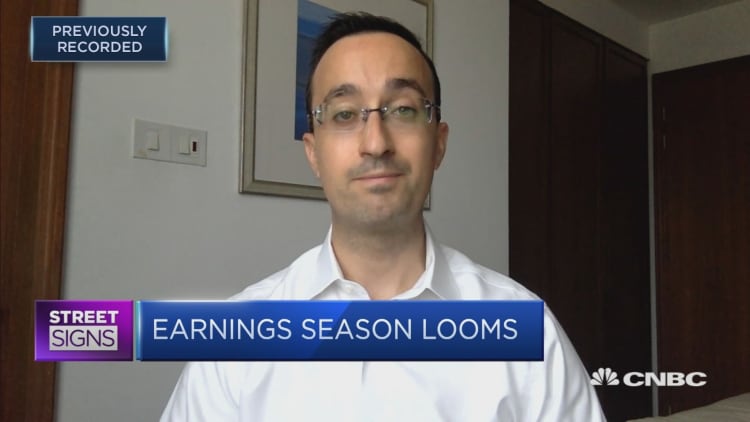South Africa has extended its nationwide lockdown for two weeks, but outlined a set of criteria for lifting restrictions, with coronavirus cases in the country so far avoiding the sharp trajectory seen in Europe and the U.S.
South Africa remains the most affected country in Africa by the pandemic, with 2,415 confirmed cases as of Wednesday morning according to data compiled by Johns Hopkins University. However, the spread of Covid-19 to date has been far less severe than expected.
President Cyril Ramaphosa highlighted in a national address last week that the rate of new infections had slowed to just 4% since stringent lockdown measures were implemented on March 27, down from 42% when the virus first arrived in the country. More than 83,000 tests have been conducted so far, although this remains well below the target of 10,000-15,000 tests per day.
The lockdown measures, which are being enforced by police and the army, forbid South Africans from leaving their homes except to seek medicine or medical care, buy food and supplies or collect a social grant. The sale of alcohol and cigarettes is also prohibited.
In his address to the nation Thursday, Ramaphosa said that while there was still a need for greater testing and efforts to gauge the infection rate, this represented "real progress."
However, he cautioned that ending the lockdown too early risked "reversing the gains" and "rendering meaningless the sacrifices" made by all South Africans.
Milestones for reopening
On Monday, South Africa's Health Minister Zweli Mkhize and chairman of the country's Covid-19 advisory committee, Salim Abdool Karim, gave a live online briefing to outline the criteria under which the country would be reopened.
Karim suggested that the current trajectory was due to "curtailed community transmission from effective early interventions" but stressed that an "exponential curve is almost inevitable."
He said that whether the lockdown would be lifted would depend on the average rate of new infections between April 10 and April 16. Should infections rise by more than 90 per day, an extension will be implemented, but daily increases of between 45 and 89 may open the door to an easing of restrictions.

"By all accounts, South Africa's response to Covid-19 has managed to stem the tide in infections. Leaders like Mr. Ramaphosa and Dr. Mkhize have also handled the communications challenges well," NKC African Economics analyst Louw Nel said in a note Tuesday.
"However, concerns persist over the government's implementation of the mitigation strategies, not to mention the public performances of less astute Cabinet members."
Notably, Communications Minister Stella Ndabeni-Abrahams is serving a two-month suspension for breaching lockdown rules, while Police Minister Bheki Cele has "noted with concern" the illegal sale of alcohol and cigarettes by officers during enforcement of the lockdown.
Defence Minister Nosiviwe Mapisa-Nqakula has also been pushed to condemn heavy-handed tactics used on civilians by military personnel amid criticism from human rights organizations, including Amnesty International.
Economic cost
The International Monetary Fund (IMF) now projects that South African GDP (gross domestic product) will contract by 5.8% in 2020 as the economic impacts of the global and domestic shutdowns are brought to bear.
The South African Reserve Bank (SARB) projects a 6.1% contraction, a drastic increase from the 0.2% shrinkage expected just three weeks ago.
The two-week extension of the South African lockdown alone is expected to cut overall consumer spending by $7.5 billion in 2020, according to NKC, representing a reduction in per capita consumption of around $125 this year. Taking into account the five-week lockdown, NKC forecasts consumer spending at $186 billion this year, reflecting a 7.1% reduction from 2019.

Following an emergency meeting over the Easter weekend, the SARB decided to cut the country's benchmark interest rate by 100 basis points to a record low of 4.25%, following another 100 basis point cut in March.
SARB Governor Lesetja Kganyago cautioned that the sharp economic contraction, increased fiscal risks, a weakening currency and higher borrowing costs for the government, banks and businesses have heightened the risk to South Africa's economy.
However, the extended lockdown and slower recovery will place downward pressure on inflation, the SARB's Monetary Policy Committee highlighted, which in turn could free up space for monetary policy to respond to the demand shock caused by the pandemic.
"A looser monetary stance will support the economy on the margins and the SARB has adopted a wide variety of measures to improve liquidity conditions," NKC's Jacques Nel said in a note Tuesday.
"While the SARB was well-positioned to increase monetary stimulus, the magnitude of the Covid-19 economic shock means there is little it can do to prevent an economic crash this year."

